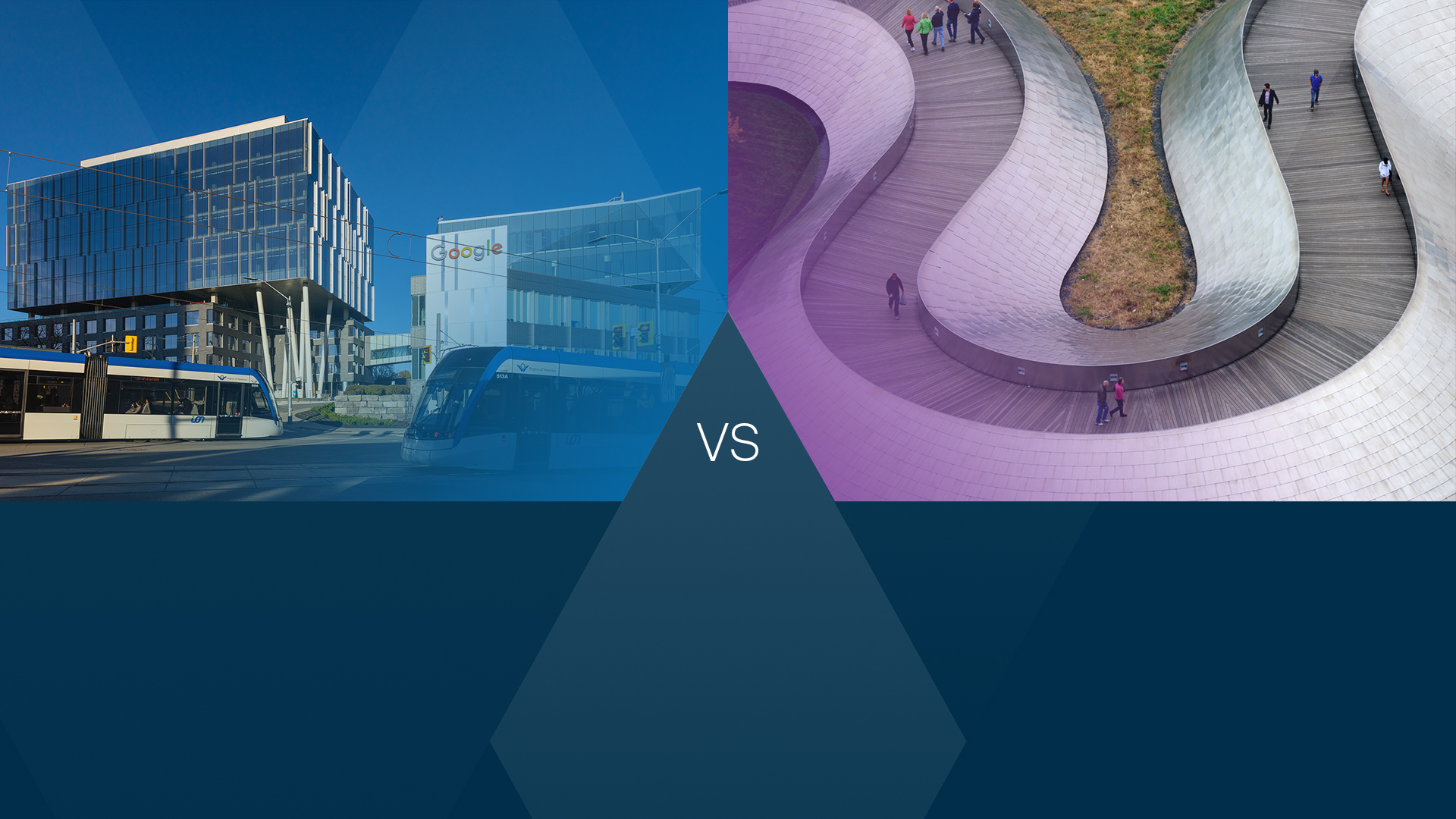With central locations and easy access to major markets, both Waterloo and Chicago are strong contenders for tech expansion.
They each have highly respected universities producing the next generation of talent in fields like engineering, computer science and business. Both offer diverse tech ecosystems, thriving with startups, established companies and a strong network of incubators and accelerators. And with cultural attractions and vibrant arts-and-culture scenes, the Waterloo and Chicago regions are both known for their quality of life.
How do you choose the right one for your growing tech company?
Comparative data can help. It brings clarity to the decision-making process by highlighting the unique advantages of each location – in this case, Waterloo and Chicago.
Here’s how Waterloo and Chicago stack up.
Key Takeaways
- Although Chicago has a larger tech workforce, Waterloo outperforms Chicago in tech talent concentration and growth
- Chicago’s overall population is declining by 1%, while Waterloo region’s is growing by 16%
- Setting up a tech company in Chicago costs $17M more than in Waterloo
- The Waterloo community has a stronger percentage of immigrants of the total population, highlighting our diversity
Data Point #1: Tech workforce size and growth
Source: CBRE Scoring Tech Talent Report 2025
Waterloo significantly outperforms Chicago in tech talent concentration and growth.
Although its total tech workforce is smaller, Waterloo’s tech talent concentration – the percentage of total employment in tech – is more than three times higher than Chicago’s. This metric is a strong indicator of a region’s tech focus and growth potential. And don’t forget that our community is right beside Toronto, the sixth largest tech labour pool in North America.
Over the past five years, the Waterloo ecosystem’s tech workforce grew by 58.2%, while Chicago’s only increased by 4.7%. With strong concentration and sustained growth, Waterloo offers a highly educated, motivated workforce ready to contribute to the success of innovative tech companies.
Data Point #2: Population growth
Sources: Lightcast, 2025. Population growth from 2018-2023 at the CD/MSA level; CBRE Scoring Tech Talent Report 2025
Waterloo outperforms Chicago in every category of population growth – especially among young professionals. While Chicago is seeing declines across the board, including a 7.1% drop in the 20–30 age group and an overall population decrease of 1.0%, Waterloo is trending in the opposite direction.
This shift suggests a shrinking talent pool in Chicago, along with potential challenges around workforce attraction, collaboration and long-term retention.
In contrast, the Waterloo area continues to attract professionals from diverse backgrounds, particularly in the new-grad and millennial demographics. In fact, Waterloo ranked #1 among all regions profiled in CBRE’s 2025 Scoring Tech Talent report for growth in the 20-30 and 30-40 age groups.
As Marcos Machado, Executive Director of Meta IT in North America, puts it: “Waterloo is famous for the quality of people and the quality of education. Many people believe that it’s the next Silicon Valley and we wanted to be part of this.”
Data Point #3: Estimated one-year company cost (USD)
Source: CBRE Scoring Tech Talent Report 2025 – based on office space and wages for 500 people
Setting up a tech company costs about $17M more in Chicago than it does in Waterloo. With an annual price tag of approximately $56M for office space and wages, Chicago is substantially more expensive than the Waterloo ecosystem for the same company setup.
Plus, Chicago’s office vacancy rate currently stands at 27.3%, which is the highest among all eleven regions featured in our Tech Data Book. Waterloo’s office vacancy rate is 17.9%.
A lower vacancy rate can signal strong demand to live and work in the area – an encouraging sign for tech companies looking to hire and retain talent.
Data Point #4: Payroll taxes
Source: Taxes from respective governments – based on an average office-based employee salary of $75,000 USD
Payroll taxes in Waterloo are lower than in Chicago. There’s a $1,500/year difference between the two areas. A large part of this is due to the favourable exchange rate.
Salaries are higher in Chicago, but even if the salaries for software engineers are equal ($75,000 USD), Waterloo still wins this category.
Lower payroll taxes make it easier to scale teams – helping companies grow faster while keeping costs in check.
Data Point #5: Diverse talent
Source: Statistics Canada, 2021 Census & U.S Census Bureau, 2024
The Waterloo region’s diversity is a key strength in the tech ecosystem and the broader community. On the tech scene, global talent is essential to the success of growing tech companies. They bring new perspectives, innovative ideas and a wide range of experiences that can enhance tech innovation.
Our community is more diverse, too, which has deepened our arts-and-culture scene, contributed to the success of educational institutions and fostered a more inclusive, welcoming environment. The quality of life in Waterloo adds to its appeal, not just as a place to live, but as a region where companies and talent can thrive.
Our Tech Data Book features thirteen tables comparing salaries, taxes, population growth, talent diversity and more across eleven North American tech hubs – including Pittsburgh, Austin and Silicon Valley.
Download your free copy today.
